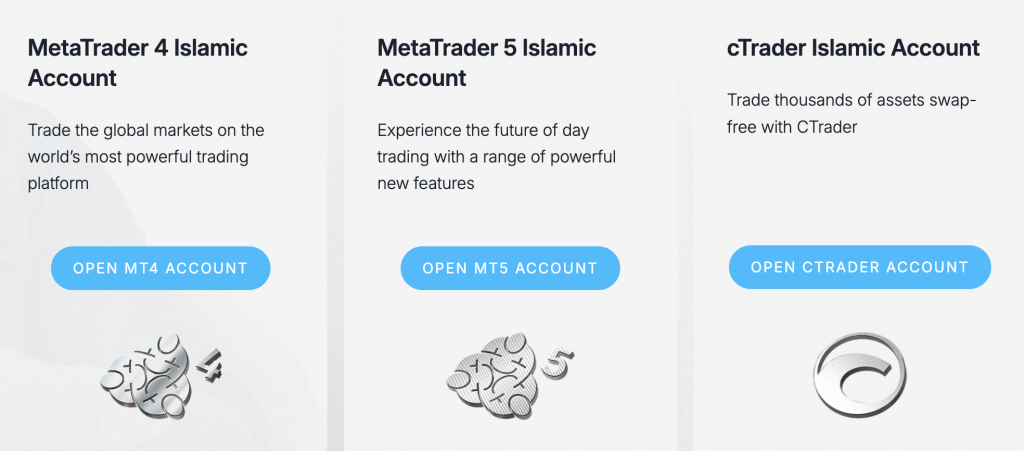Best Islamic Swing Trading Brokers 2026



For Muslim swing traders, the challenge is not only about timing the market. It’s also about making sure every trade is carried out in line with Islamic principles. That’s where Islamic trading accounts—often called swap-free accounts—play an important role.
We’ve done the hard work to find the best brokers that offers Islamic accounts.
How SwingTrading.com Chose The Top Halal Brokers
We identified the best Islamic brokers by reviewing their swap-free account offerings in detail, checking eligibility rules, hidden fees, and how closely they align with Sharia principles.
Our team combined data analysis with hands-on account testing to verify transparency and trading conditions, ensuring our recommendations highlight brokers that genuinely provide fair, compliant Islamic accounts rather than repackaged standard ones.
What To Look For In A Halal Broker
The Real Meaning Of ‘Swap-Free’
Most standard trading accounts apply something called a ‘swap.’ This is a fee (or sometimes a credit) added when a position is held overnight. Technically, it’s an interest charge, and that makes it incompatible with Islamic finance.
An Islamic account removes swaps. But not all brokers stop there. Some replace swaps with other kinds of fees, such as ‘administration charges’ or ‘financing costs.’ These daily fees may not be called interest, but they can add up quickly.
If you hold trades for a week or more, those charges can eat away at profits. In some cases, they turn out to be even higher than what a regular swap would have cost.
The key is to confirm whether the account is genuinely swap-free. The broker should make it clear if there are additional charges for keeping trades open. The fine print usually reveals whether a swap has been replaced with something else.
Time Limits On Holding Positions
Another common issue with Islamic accounts is time limits. Some brokers we’ve tested allow trades to be held swap-free for only seven or 14 days. After that, they start adding fees or, in extreme cases, they may close the trade altogether.
This setup might be manageable for very short swing trades. But many swing traders prefer to let trades run for two or three weeks if the market conditions are still favorable. With strict time limits, the strategy doesn’t work.
That’s why it’s important to check whether the broker has such restrictions. A 7-day cap might look harmless at first, but if you plan to hold trades longer, it can become a serious obstacle.
Asset Coverage Under Islamic Terms
Not every asset in a broker’s lineup is always available on Islamic terms. Forex pairs are usually covered. But what about gold, silver, oil, indices, or stocks?
For swing traders, variety matters. Many prefer to diversify positions across several instruments rather than focus on a single market. If the Islamic account only applies to major forex pairs, it may feel too restrictive.
Some brokers extend swap-free conditions to metals and indices as well, which makes the account more flexible. Others limit it so tightly that it’s almost the same as offering no real choice at all.
Checking which instruments are included under Islamic rules is essential before opening the account.
Transparency & Documentation
Trust depends on clarity. A reliable broker explains exactly how its Islamic accounts work. The terms should be written out, not just mentioned vaguely on a website banner.
Clear documentation makes it easier to know what to expect. It prevents unpleasant surprises such as hidden charges or unexpected limits. On the other hand, if the rules are vague, missing, or inconsistent, that’s usually a sign to be cautious.
Being able to review the details before funding an account is a basic requirement. If a broker hesitates to share them, it raises questions about what might be hiding behind the scenes.
Fairness Compared To Regular Accounts
Even when swaps are removed, some brokers make up for it in other ways. One of the most common tactics is widening the spread or increasing the commission for Islamic accounts.
That means the cost of entering and exiting trades is higher for Muslim traders than for others. From a fairness perspective, this feels more like a penalty for choosing swap-free conditions.
The simple way to check is by comparing the spreads and commissions of both account types side by side. If the Islamic version costs noticeably more, then it’s worth questioning whether that broker is really offering a fair deal.
How Simple The Process Is
Opening an Islamic account can be straightforward or complicated, depending on the broker. Some ask for a lot of additional paperwork, including proof of religion. Others make it easy by letting you switch to swap-free mode directly in your account settings.
While a few extra steps aren’t a problem, the process shouldn’t feel like an obstacle. What matters is that the account terms are legitimate and easy to manage.
If the setup is unnecessarily complicated, it often signals that the broker doesn’t really prioritize its Muslim clients. A smooth and respectful process usually indicates the opposite.

FP Markets’ swap-free accounts are designed exclusively for Muslim traders
Community Feedback
Official terms only tell part of the story. What really shows how an Islamic account works in practice is the feedback from traders who already use it.
Muslim trading communities often share experiences with different brokers. Sometimes they report hidden fees, sudden policy changes, or other issues that don’t appear in the documentation. This feedback can save a lot of time and frustration.
Checking forums, reviews, or even talking directly to other traders can reveal details that would otherwise go unnoticed.
Matching Broker Terms To Strategies
Finally, the right broker depends on your own approach. Swing trading isn’t the same for everyone. Some traders prefer short swings lasting just a few days. Others hold positions for several weeks.
The account terms need to match that strategy. A strict 7-day limit might be acceptable for short swings but useless for longer trades. Similarly, if you focus on gold or indices, you will need an account that covers those assets, not just forex.
No broker will be perfect across the board. The key aspect is ensuring the Islamic account aligns with your strategy.
Bottom Line
A good Islamic swing trading account should be genuinely swap-free, free of hidden costs or strict time limits, and clear about which assets are covered.
What matters most is finding terms that are fair, transparent, and practical for holding trades over days or weeks, so your strategies stay intact without compromising your Islamic principles.
